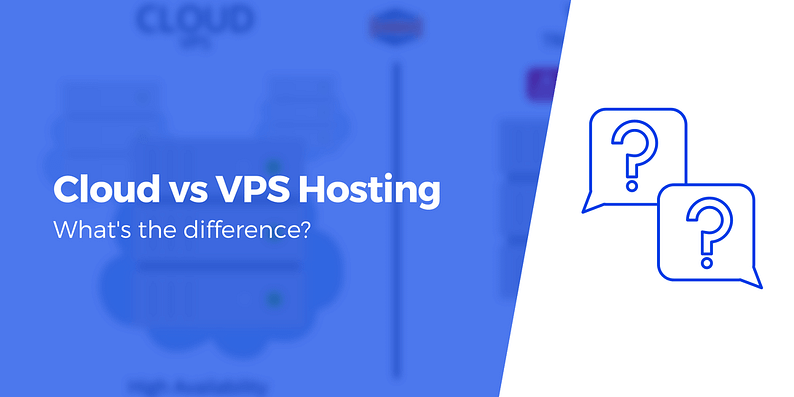Trying to understand the difference between cloud vs VPS hosting?
The reason you’re struggling to find the best cloud VPS hosting providers is, there’s really no such thing as “cloud VPS hosting” or “VPS cloud hosting”.
What you’ll find, instead, are cloud hosting providers, VPS hosting providers, and dynamic web hosts that happen to offer both cloud hosting and VPS hosting in separate packages.
You see, while “cloud hosting” and “VPS hosting” are sometimes used interchangeably, the two are not direct synonyms for each other. They differ in terms of architecture, performance, scalability, cost, and resource availability. That means you can only pick one – hence cloud vs VPS hosting.
Now that’s where things get difficult. Discerning the two can be confusing, let alone choosing the best one for your needs. But don’t worry, 😎 we’ll help you out by comparing and contrasting VPS hosting vs cloud hosting in detail.
What is VPS hosting?

VPS hosting stands for virtual private server hosting, a web hosting method that uses virtualization to split a single physical server into several independent micro-servers. Each of the micro-servers operates as a virtual dedicated server – complete with its own operating system, resources, and applications.
One of the key benefits of VPS hosting is environment isolation. Despite multiple users sharing the same physical server, each virtual server runs independently without sharing resources with other VMs. This is one of the key differences between VPS hosting vs shared hosting.
👉 This ensures privacy and security for all users, which is especially important if you’re handling sensitive data.
What is cloud hosting?

Cloud hosting is a type of web hosting service that rides on a network of interconnected servers – “the cloud.” Unlike the traditional form of hosting a website on a single physical server, cloud hosting combines multiple servers to provide superior scalability, performance, and dependability.
This hosting environment is designed to handle sudden traffic spikes. Some of its providers give you the freedom to scale your resources up or down as the website’s demands shift.
In return, cloud hosting providers bill users according to the resources they consume – such as bandwidth, storage, and CPU usage. This makes it a flexible and cost-effective option for businesses that want to control their hosting resources.
What are the differences between cloud vs VPS hosting?
A traditional VPS and a cloud server share several similarities in their configuration. But, they differ in the method of deployment and management.
With VPS hosting, a virtual server is hosted on a single physical server, giving users greater control over their hosting environment.
In contrast, cloud-hosted environments are deployed on a virtual partition that spans multiple physical servers. This facilitates efficient resource scaling without being limited to a single server.
👉 Now, on comparing VPS hosting vs cloud hosting beyond these structural differences, the following will emerge:
Cloud hosting vs VPS hosting performance 🔋
The purpose of cloud hosting is to deliver exceptional performance, scalability, and reliability. This is achieved by equitably distributing resources from multiple interconnected servers.
If your website ever experiences a sudden surge in traffic, it’s possible to allocate more resources for increased responsiveness – it all depends on the web host you’re dealing with. Conversely, if the traffic volume drops down, some cloud hosting providers allow you to save costs by scaling down the resources.
This type of automatic optimization is called “automatic scaling” or “auto scaling,” and it can be one of the big advantages of using cloud hosting.
VPS hosting can still provide excellent performance and reliability, but it may struggle during times of high traffic. Your site or application won’t be able to stretch its resources beyond the confines of the hosting VM.
Cloud hosting vs VPS hosting availability 💻️
When it comes to uptime, cloud hosting is generally more reliable than VPS hosting. This is because cloud hosting is built on a distributed infrastructure that includes multiple servers and redundant storage. If any hardware failures or other issues ever occur, the servers automatically switch to backup resources.
In contrast, VPS hosting is usually based on a single physical server that is partitioned into multiple virtual servers. So, if the physical server fails, all the VPSs hosted on it will be affected.
That notwithstanding, the cloud vs VPS hosting availability contest also depends on the quality of infrastructure, the level of redundancy, and the expertise of the hosting providers.
Cloud hosting vs VPS hosting security 🔒️
VPS hosting environments are as secure as their dedicated counterparts, since each VM is completely isolated from the rest. This means that even if another website on the server is hacked or infected with malware, your website won’t be affected.
That’s not to say that VPS hosting is entirely risk-free. If a DDoS attack is directed at another website on the same physical server, it could still affect your VPS allocation.
It is worth noting that with VPS hosting, users are granted complete root access to their virtual server. This allows you to configure and personalize security measures – such as firewalls and security software. So, in essence, you’ll have control over the level of protection implemented on your server.
Cloud hosting is pretty secure too, as it also keeps your website separate from the rest. Plus, you’ll have the flexibility to deploy your own security measures on top of the default ones.
Cloud hosting vs VPS hosting scalability 🏗️
Cloud hosting is often highly scalable because it’s built on a distributed infrastructure with multiple servers, which allocate and scale resources on demand.
Some of the service providers in this category allow you to add or remove system resources as per your requirements. You get to bump up your resources to accommodate increased demand, and then scale them back down during low-traffic periods. The resultant bill is then calculated based on the resources that you used.
While not all cloud hosts offer automatic scaling, it’s usually still easier to scale resources with cloud hosting manually. Because the resources are spread across multiple servers, you can make cloud hosting as “big” as needed.

The same cannot be said for VPS hosting, where the amount of available resources is determined by the capacity of the underlying physical server.
The more VPSs you have running on the same server, the smaller the room for growth. And as some users add resources to their virtual machines, there’s less unused hardware left for the rest.
VPS providers additionally offer preset plans that may not fit your exact needs. While cloud hosting systems allow you to pay as you go, VPS denies you the privilege of defining your server’s exact configuration.
Cloud hosting vs VPS hosting customizability 🎨
When it comes to customization, VPS hosting is comparable to dedicated hosting. With root access, you have complete control over your VPS – including its operating system and software installations.
Cloud hosting also offers a degree of customization – such as configuring firewalls, network architecture, and load balancing. But, to protect the vast network of interconnected servers, your hosting provider may limit your system customization privileges. There are many things you won’t be able to modify, as they might affect the overall performance of the hosting environment.
But, even with the limited customization, you’ll notice that cloud hosting is more complex than other hosting methods because of its distributed nature. You need deep technical knowledge to take advantage of all the available configuration options.
Cloud hosting vs VPS hosting cost and value 💸
VPS and cloud hosting are both affordable alternatives to dedicated servers. They provide reliable, high-performance hosting at a fraction of the cost of dedicated hosting.
Cloud hosting, in particular, is known for its flexible pricing. Providers will charge you based on the precise amount of resources used – such as CPU, RAM, storage, and bandwidth. Many cloud hosts even offer hourly billing, which helps you save a lot of money if you’re using automatic scaling.
This pay-as-you-go structure makes it a practical hosting option for businesses of all sizes – especially those with fluctuating resource demands.
VPS hosting, on the other hand, offers pricing plans with fixed resources. Hence, it suits websites with consistent resource needs. You’ll be getting somewhat of a dedicated server environment without the high cost of dedicated hosting.

Costs can, however, rise pretty sharply when your website is growing. And that’s because VPS hosting only provides additional resources after you’ve upgraded to a higher-priced plan.
Cloud vs VPS hosting: Which to choose?
Now that you have some background on cloud vs VPS hosting, let’s go over some recommendations for which approach to choose for your site(s).
Who should use cloud hosting instead of VPS hosting?
On comparing cloud hosting vs VPS hosting, we can agree that the former is the go-to option for businesses that require high levels of scalability, reliability, and security. These are websites or applications that experience high traffic or require additional resources every now and then.
By subscribing to cloud hosting, they get to seamlessly upscale and downscale resources as needed. That should save them money while keeping their websites or applications running smoothly.
A good example would be businesses that run large web-based operations. Cloud hosting gives them the flexibility to handle sudden changes in demand, which then translates into a smooth user experience during peak and off-peak seasons.
👉 Some of the best cloud hosting providers that you could try out include:
If you’re not a developer, the easiest way to utilize cloud hosting is with the help of server control panel tools/services such as Cloudways, RunCloud, CyberPanel, and so on.
Who should use VPS hosting over cloud hosting?
For small to medium-sized businesses that just need dedicated resources, VPS hosting would be a better fit. It provides the same level of customization as a dedicated server, complete with full root access.
This should especially suit you if you have a predictable traffic flow. Then, if you’re in an industry that is prevalent with cyber attacks, you’ll appreciate the extra security that VPS hosting offers.
Whatever your case is, keep in mind that you’ll need some technical expertise to configure your VPS server.
👉 Some of the best VPS hosting providers that you could check out include:
Overall, though, cloud hosting is probably a better option for most people in 2023 and beyond.
Final thoughts on cloud vs VPS hosting 🏁
That wraps up our guide to cloud vs VPS hosting.
To see some more great options, you might want to check out our full roundups of the best cloud hosting providers and the best VPS hosting providers.
And if you still have any questions about cloud vs VPS hosting, please let us know in the comments section below.





















Or start the conversation in our Facebook group for WordPress professionals. Find answers, share tips, and get help from other WordPress experts. Join now (it’s free)!